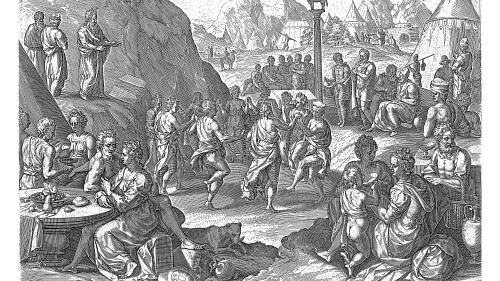The prejudice against Israel in higher education institutions has been so widespread and pervasive that hardly a week goes by without news reports about anti-Israel and antisemitic incidents on campuses. What is less known, however, is that the anti-Zionist stance is not constricted to student activism but has become a supposition of most social sciences scholarship treating the modern Middle East or modern Muslim societies. This, in significant part, is an uncritical acceptance of the Palestinian and Arab nationalist narrative as the historical account of the beginning of Middle Eastern political modernity, which is often annexed into a post-colonial anti-Western ideological perspective, resting on a historical condemnation of capitalism as the ideological source of all evils of Western imperialism, that is so deeply entrenched in the social sciences today.
My recent experience at George Washington University’s Elliot School of International Affairs is instructive. The school, strategically located in Washington, D.C., boasts strong ties to government foreign policy institutions and has provided the U.S. Foreign Service with many graduates. It has one of the most prestigious Middle East studies departments in the U.S. and is also the current headquarter of the notoriously anti-Israel Middle East Studies Association, which recently voted to endorse the BDS movement. Through my experience in the school, it became clear that it largely functions as an ideological camp for leftist scholars and students. It is also the home of notoriously pro-Palestinian professors, such as Ilana Feldman, an anthropology professor and a former Vice Dean of the school, and a prominent BDS activist. And Marc Lynch, a celebrity Middle East studies professor with a general readership and whose scholarship shows a pro-Palestinian and a nearly Chomskyan view of Israel.
It is impossible to understand such hostility without understanding the ideological worldview of which it is a part and is the default position of mainstream Middle East scholarship.
To say the Elliot School is uniquely anti-Israel would be to miss the mark entirely. It merely reflects the scholarly consensus of the most prestigious social sciences scholarship that is ideologically rooted in critical theory and postmodern ideology. Such analytical structures are erected upon a foundation that incorporates Marxian and anti-Western convictions. In other words, the hostility towards Israel is not an outcome of an analytical process but a presupposition of a scholarly construct with coercive contents that delegitimatize alternative views. It is impossible to understand such hostility without understanding the ideological worldview of which it is a part and is the default position of mainstream Middle East scholarship. This has led to a situation where the assumption that Israel is a colonialist oppressive power is often used as a starting point to construct further analytical structures unrelated to Israel or the Middle East. Israel has become merely a point of reference used for comparative purposes that indirectly passes the condemnatory judgment on Israel to the students.
An example of this would be how a theoretical scholarly discussion about state coercive power and democracy in The Dark Side of Democracy, a book by UCLA professor Michael Mann, Israel is casually and indirectly accused of murder and compared unfavorably to the Soviet Union and socialist Yugoslavia by way of example:
“Regimes that murder large numbers of their citizens cannot be considered democracies, since they are grossly infringing the civil liberties part of democracy... But there is a disturbing number of exceptions. European settlers from the 17th century on were more genocidal if they lived under constitutional rather than authoritarian governments. Perhaps settler democracies are better described as ethnocracies, democracy for one ethnic group... [like in the] case of Israel. The Soviet Union and Tito’s Yugoslavia usually damped down ethnic conflict....”
For postmodern scholars, no pretense of academic objectivity is required. In Ted Swedenburg’s Memories of Revolt, the author, who teaches at the University of Arkansas, makes the case to dismiss academic training which requires objectivities and asserts that Palestinian claims of victimhood, regardless of their actuality, and believe that Israel is a dominant oppressive state, hold a much stronger truth value. This form of activist scholarship is also very prevalent in academia and depends on the theoretical work of Michel Foucault. In book-length, the author defends Palestinian terrorism no matter how gruesome and brutal and encourages his academic readers to do the same.
In Middle East analysis, the historical narrative upon which this social science rests is nearly identical to the ideological narrative of Arab nationalism, which starts from the claim that European colonialism exploited the Middle East and destroyed its social and cultural fabric. It colonized Muslim societies both territorially and culturally and destroyed their traditional structure, a catastrophe from which Arabs never recovered. This European imperialism is considered to be an integral part of a uniquely diabolical ideology called capitalism. The story of how the British and the French conspired to territorially divide the region, epitomized in the myth of Sykes-Picot, is considered to be the starting point of modern Middle Eastern politics and societies and on which all subsequent political turmoil in the region is blamed. The establishment of the State of Israel in 1948 is then solidly embedded in this narrative and appropriated to the Western colonialist legacy in the region.
The Palestinians assume the role of the ultimate victim class of a system of domination that is specifically constructed to enshrine a power structure that is oppressive, authoritarian, and predatory in favor of racist Zionism.
This is the metanarrative from which all social science scholarship on the Middle East proceeds. Any discussions of political science, international relations theory, or historical sociology of the region takes it as a starting point. The scholarship then proceeds to politically analyze an Arab world that remains uniquely politically vulnerable to constant Western manipulation and how international institutions are explicitly constructed to dominate and maintain Western power. In this metanarrative, Israel is unquestionably considered a part of a domineering Western camp. Disproportionately more powerful, Israel establishes itself as a regional hegemon and uses its might to punish, disrupt, and destabilize. The large Arab democratic deficit and lack of human, social, economic, and political development are then seen as the result of the works of such international imperialistic forces. The Palestinians assume the role of the ultimate victim class of a system of domination that is specifically constructed to enshrine a power structure that is oppressive, authoritarian, and predatory in favor of racist Zionism.
Completely absent from the scholarship is any contrarian or Zionist perspective. Historical information is selectively picked and organized to support the ideological structure. Graduate and undergraduate students lack the tools to question or think differently about the region’s politics. Professors insist on starting the modern sociopolitical history of the region from colonialism and Sykes-Picot, completely excluding major events such as the mass expulsion of Mizrahi Jews from Arab countries. Students can obtain a graduate degree in Middle East studies from such a prestigious university without ever encountering information about antisemitism or antisemitic terrorism in Arab societies. This leads to the removal of important political and social contexts without which Israeli actions always seem like unprovoked aggression. An example of this would be the discussion of the Israeli invasion of Lebanon in 1982. In a graduate class dedicated to Lebanese politics, a discussion of the Israeli invasion without any larger context of years of terror operations targeting Israeli civilians, originating in southern Lebanon by Palestinian guerrilla groups, gave the students the impression that Israel suddenly decided to invade an Arab country for no compelling reason.
Mr. Kiamie ended the class with the deceleration that colonialism is indeed the only analytical concept through which to analyze the modern Middle East and that this will be the underlying logic of his class.
In a graduate class of Comparative Middle East Politics taught by Charles E. Kiamie, III, who is also Deputy Director of the U.S. Agency for International Development’s (USAID) Center for Education, Mr. Kiamie organized his introductory lecture specifically on colonialism and Edward Said’s Orientalism providing readings that range from a complete demonization of Zionist “settler colonialism,” to the proclamation that the West is racist towards Islam because Islam is anti-imperialist. In the class, I engaged in an hour-long discussion with the professor on the reliability of Said, an ideological polemicist, as an introduction to a social science class and the objectivity of colonialism as an analytical category that is able to, as his reading suggested, explain everything from failed Middle Eastern states to migration, climate change, and the rise of Donald Trump. I also proceeded to question the theoretical basis of considering Zionism settler colonialism or that Islam is anti-imperialist. After a long conversation, eventually, and with noticeable frustration, Mr. Kiamie ended the class with the deceleration that colonialism is indeed the only analytical concept through which to analyze the modern Middle East and that this will be the underlying logic of his class. I then decided to withdraw from the class and use limited resources elsewhere. It is important to note that a few students, two military officers, and one civilian reached out to me after the class to tell me this was their first time heating a rebuttal of Edward Said or deconstruction of colonialism as an ideological device and not a real analytical category.
In another class, International Relations in the Middle East, not a single reading provided was friendly or even neutral towards Israel. Most of the international relations literature was either Marxist or Marxian in its ideological underpinnings. In a week dedicated to international law and international relations, the professor picked Noura Erakat’s Justice for Some, a book of anti-Zionist propaganda from which trying to learn anything that is related to the mechanics and workings of international law proves to be frustratingly difficult. Despite my disagreement with Erakat’s position, I was looking forward to learning about the workings of the international legal system between states, only to be disappointed. Other readings ranged from critical political economy analysis of international relations as a function of capitalism or that Israel and the U.S. are hegemonic and oppressive powers. Any of my attempts to question the theoretical basis of this worldview or to question the glaring absence of critical historical and social context, which includes modern Arab intellectual history, was simply incomprehensible because they didn’t conform with the ideological structure of the class. Attempts to talk about antisemitism, Nasserism, Islamism, Jihadism, or Baathism were usually ignored and sidelined. The only ideology that the class was able to discuss was that of “capitalism.”
The story of Israel in academia is not just the story of unchecked prejudice and ambivalence to the Jewish and Israeli lives in the Middle East, but it is a story of institutions of higher learning which are increasingly becoming a source of dogmatism and ideological obfuscation of reality. Today, the social sciences, whether wittingly or unwittingly, are more geared toward creating intellectual conformity disguised as critical consensus and critical theories rather than creating a new generation of students capable of genuine critical thinking capable of questioning hidden presuppositions and masked assumptions. Moreover, such an environment proves itself to be not just hostile to those with contrarian views but hospitable to extremist, antisemitic, anti-Israel, and anti-democratic ideologies from overseas.
Hussein Aboubakr Mansour is the Director of EMET’s Program for Emerging Democratic Voices from the Middle East and a writing fellow at the Middle East Forum.








